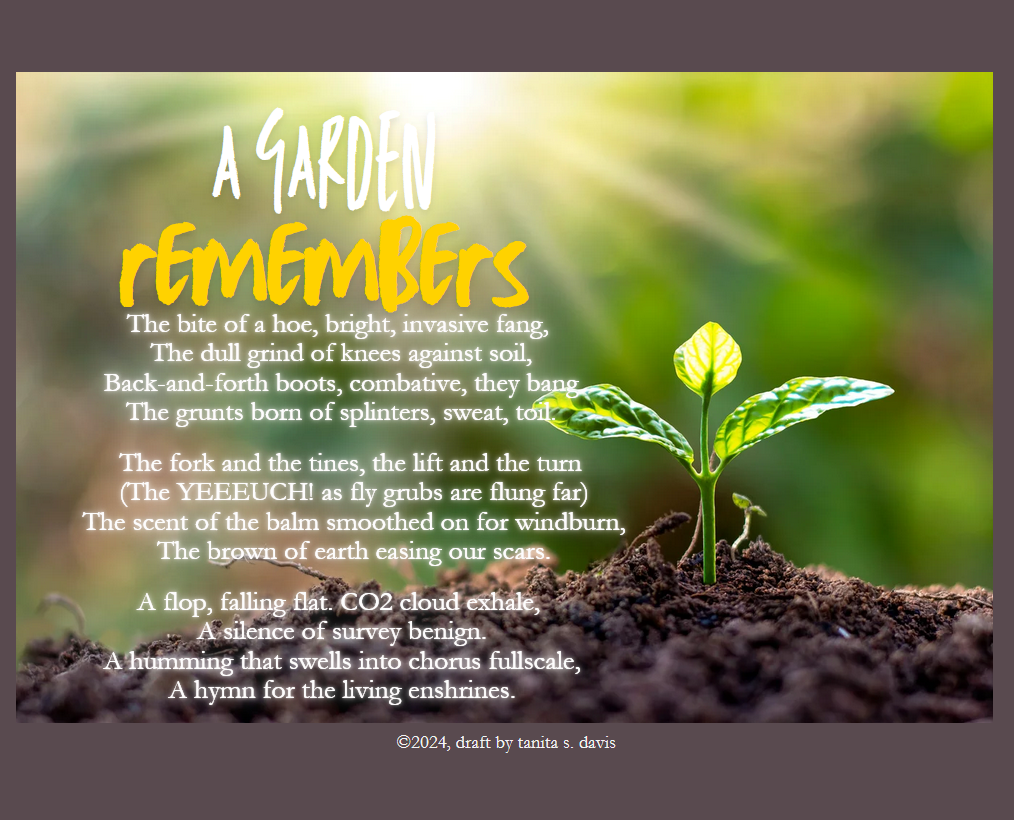Welcome to another Poetry Friday Poetry Peeps Adventure!
Poetry Peeps! You’re invited to our challenge for the month of May! Here’s the scoop: We’re writing in the style of Lucille Clifton’s homage to my hips, and choosing our own body parts to pay homage to. Are you a fan of your neck? Have you always wanted to write a sonnet to the bumps on your tongue? You can read a few body part poems to get your motor running (or, listen to Miss Lucille read! You’ll get goosebumps). Are you game? Good! Whatever song of yourself that you sing, you have a month to craft your creation and share it on May 31st in a post and/or on social media with the tag #PoetryPals.
Welcome to the wondering, as we sit in this space of unanswerable questions. This month’s challenge might have been a bit more complex to me if I hadn’t already been in a sort of… unfettered frame of mind. One thing that committing to writing a poem a day for NPM does for me is break me out of “regular” lines of thought, and make me fall swiftly into a state where I can dive deeper into words. A whole month of thinking sideways made unanswerable questions a little more accessible, a little more instinctual to me.
There are others who grapple with the unanswerable this month. Sara’s poem is here. Tricia’s is here. Here’s Laura’s poem, and Liz’s poem is here, and Mary Lee’s poem is here. Michelle K’s poem is here. Other Poetry Peeps may be checking in throughout the weekend with their poems, so don’t forget to stop by for the roundup. In the meantime, Poetry Friday is hosted today by Ruth, @There Is No Such Thing As A Godforsaken Town. Thanks, Ruth!
From Process…
Our process was less straightforward this time, and more… gauzy. To begin, the Poetry Sisters got together and made lists of unanswerable questions – or what they felt were fairly esoteric questions in the moment. The list was long, but they were a delight to read through. How many rings in a doorbell? Where does an echo go? What is the best time to lose? How do you know when you’re grown? Who loves you best? What color is a mirror? How much change is enough? Why now? What does the oak know?
Last month, Padraig Ó Tuama’s prompts for the pantoum really resonated with me. We were instructed to write a line about something that’s become ordinary for us, or to write a line showing us an object that’s associated with this ordinariness. In answering the prompt, I wrote about dirt, about dust and birds, fence posts, and the horizon through the window. What else, I wondered, could I expand on in a way that embraced the ordinary? People are cottage-core fixated on the After of the Before & After phases, when things are pretty, when the flowers are blooming and the honeysuckle is curling ’round the door. Cottagecore doesn’t seem to encompass sweating and tripping over dirt clods.
The question that appealed most to me was a variation on the last… What does the oak know…about me? A few years ago, I wrote a mask poem about a plum tree which narrated its concerns (or lack of them), about the phoebe which lived in its branches, its human, and the world around it. I think of this poem as in conversation with that one.
…To Poem
What does the garden remember of us? The weeding, turning, digging, and planting? The watering, sweating, grunting, squealing (in joy or dismay when spiders or crane fly larvae make themselves known)? The sighing, early morning stumbling, surly muttering or full-voice singing over the noise of the tiller? What do any of us know of this season, in comparison to what it knows about us?
A Garden Remembers
The bite of a hoe, bright, invasive fang,
The dull grind of knees against soil,
Back-and-forth boots, combative, they bang
The grunts born of splinters, sweat, toil.
The fork and the tines, the lift and the turn
(The YEEEUCH! as fly grubs are flung far)
The scent of the balm smoothed on for windburn,
The brown of earth easing our scars.
A flop, falling flat. CO2 cloud exhale,
A silence of survey benign.
A humming that swells into chorus full scale,
A hymn for the living enshrines.
Padraig’s last questions in the prompt list are, “What is a single feeling you have about this ordinary thing? What do you most wish to say about this ordinary thing?” To which I can only answer – it is, and I am, and together, we are – a living thing. May you raise your own hymn to the living this weekend, revel in your ordinary extraordinariness.


Oops. I rounded the roundup early on Friday, then forgot to come back after your post went live. Delayed, but not forgotten.
I’m glad my single addition to the list of ideas bore such rich and varied fruit!
Your poem will stay with me, help me remember to ask for forgiveness for the violence I exact on unwanted plants (a whole forest of oak seedlings have been murdered this spring) and grubs. The soil has definitely felt the “invasive fang” but it has also been fed by my composted tea leaves and veggie scraps.
You remind me I need more humming, singing, and flinging myself down (preferably BEFORE my back gives out)!
You’ve enticed me to think long about the special trees in my life, Tanita; what did they see of me, like the one I sat in reading on hot summer days, a maple planted at my grandparents’ home when I was born, that trees follow us, stay still (unlike us humans) to pay attention. What you shared, “The fork and the tines, the lift and the turn” and more feels as if the tree would wonder at the human working so hard, “falling flat. CO2 cloud exhale,”, then all together, a hymn. It’s quite wonderful!
Anytime I can wonder from the perspective of another – especially the non-human living things in our world – it opens my mind and heart. Thank you for sharing your process.
I’m not the gardener in the family (that title goes to Atticus) but this put me right there, in the dirt and the struggle. I love your final observation that together you and the garden are a living thing.
Your alliterative sounds wrap around and entrance one while reading, as if enriching a chant, they are a soulful hymn relaying gardening’s grittiness which it is, and which we, gardeners do even with achey body parts and all. You captured garden’s ordinariness in an extraordinary way, touché Tanita!!!
Show us the process, not only the product–yes! Your rhymes are beautifully chosen, and I would only object a little to the compactness of your lines, since what I’m doing in the garden always seems to exceed the time I allotted for it and also my ability to attend. I’ve learned I’m good for 30 minutes, MAYBE an hour of toil and then I should put all my tools away and fling myself down, indeed.
I do always hope my garden feels that it has received a loving and refreshing spa treatment…
Thank you, Tanita. You are always so good about inviting us to participate in your monthly challenges. I have been busy reading body poems and listening to Ms. Lucille. It is inspiring! I’m adding it to my calendar, (something I had neglected to do for today’s April challenge.) I love what you did with the dirt and gardening and life. “A hymn for the living enshrines.” Yes, indeed. Beautiful poem.
I agree with Laura that you captured the violence of gardening so well, in rhythm and language and imagery. And when I think about it, yes, making things grow does involve much tearing out, and wielding of pruning shears, and stabbing of weeds. (Um, much like writing a poem, yes??) A truly unique way to answer this unanswerable question, and you did it justice. Well grown, you!
@saralewisholmes: Yes… sometimes in all too great of a parallel, there’s ripping and flinging things and swearing in both writing and gardening. I love the IDEA of a pastoral artist, in so many ways — you have the plein air people sitting pristinely somewhere on a hill, painting, you have the idea of a poet in a garret – and so many poets have inked volumes on the beauty of the lonely wandering and looking about us (looking at you, Daffodils) and we miss the mud and the sweating and the stubbing our toes and grinding out art, and yanking it from the Muse’s clawing hands…
I honestly wasn’t thinking about writing, but I should have been.
Oh, Tanita! I love the end results of “a garden” and hate the actual gardening. So this celebration of all the behind the scenes work feels so real. That first stanza especially–the invasive fang, the dull grind, the combative boots…I feel like you’ve captured that actual violence that it takes to change weedy earth into beautiful blooms. Honestly, I won’t look at someone’s garden the same way again. I knew innately that it required all this (which is why I don’t like it), but I didn’t FEEL that until reading this poem. Woohoo!
@laurasalas: It really does take violence, especially in THIS yard – so much tearing out before the easing in of new roots into welcoming soil. We have to force our way in…
Honestly, sometimes I only like “having gardened” instead of gardening, too. But – I have to take all the steps to get from one end of the bridge to the other…
I am NOT a gardener (I have a black thumb, really), but I adore this poem. I can see you flinging yourself down at the end of your work and singing your joy. And the word choices here … lovely.
@MissRumphius: I think more poems ought to including flinging oneself down, because that’s at least 55% of what I want to do most of the time. ☺